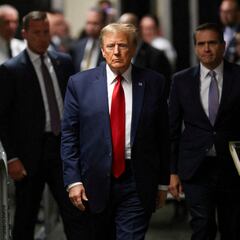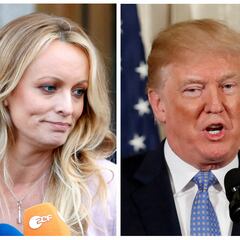What is the definition of hush money and why is it illegal?
Former President Donald Trump will appear in court in New York on Monday, facing charges related to an alleged secret payment to Stormy Daniels.

For the first time in the history of the United States, a former president is preparing to take the stand. Donald Trump is facing four criminal cases on a variety of charges and will appear in court in New York for the first of them.
Trump’s first trial revolves around an alleged $130,000 hush money payment to adult film star Stephanie Clifford, known professionally as Stormy Daniels. The trial for this case was slated to begin on 25 March but has been pushed back to Monday, 15 April, meaning that it could well be the only one of his criminal cases that is heard before this year’s presidential election.
So, what is a ‘hush money payment’ and why does Trump stand accused of doing something illegal?
What is hush money?
As the word ‘hush’ implies, ‘hush money’ is a colloquial term used to describe a payment in return for someone’s silence. Of course, paying someone not to say something is not necessarily illegal. However if the party involved decides that they need to pay someone to keep information out of the public eye, the payment will typically need to be covered up as well. It is that concealment that can lead to trouble with the authorities.
In Trump’s case there are 34 felony counts of falsifying business records, as each transaction is considered a separate crime. For Manhattan District Attorney Alvin Bragg to elevate a misdemeanor for bookkeeping fraud to a felony, he must demonstrate the intention of committing, aiding, or concealing a second crime. Michael Cohen, Donald Trump’s former lawyer, is alleged to have made the payment and will be called as a witness.
BREAKING: Former President Donald Trump tells reporters that he would "absolutely" testify in his upcoming hush money trial that is set to begin on Mondayhttps://t.co/DyoNzJO8oq
— MSNBC (@MSNBC) April 12, 2024
Why is Donald Trump in court for a hush money payment?
For figures in the public eye hush money payments are nothing uncommon, the price of doing business for those who rely on a positive perception for their livelihoods. However paying someone to maintain their silence even under oath crosses the line into illegal territory. Specifically, it could be considered obstruction of justice.
Related stories
Prosecutors in this case allege that Trump did not want the public to know about his affair with Stormy Daniels ahead of the 2016 presidential election. The case alleges that Trump’s team falsified business records in a bid to cover up the payment, which would have exposed the very information that he had spent a six-figure sum trying to keep hidden.
Falsifying business records would, ordinarily, be considered a misdemeanor but can be upgraded to a felony charge if done to conceal a crime. Manhattan District Attorney Alvin Bragg has not specified which crime his office is going to allege was hidden, but he has previously suggested that Trump fell foul of both state and federal election laws, alongside New York state tax laws. We’ll find out more when the trial begins on Monday.


Complete your personal details to comment